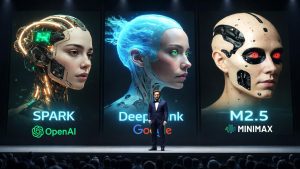Exploring the Future of AI Google’s Gemini 2.0 Enhancements

In recent developments, Google is making significant strides in the AI domain. The introduction of Gemini 2.0 marks a new era for Google’s AI capabilities. This comes after a period where Google seemed to lag behind, but now they’re back on track.
Gemini 2.0, heralded by Google’s DeepMind, brings exciting updates. It includes a new model, enhanced performance, and more intelligent features, setting a formidable stage for AI advancements. These developments hint at Google’s reimagined AI future, and there’s much more to explore.
Gemini 2.0: A Game Changer
Gemini 2.0 is an innovative AI model from Google that’s making waves. It features ultra-low latency and superior performance, particularly in multimodal workflows. But its capabilities go beyond speed. This model is highly intelligent, adaptable, and impressively uncensored, providing a refreshing openness through its API.
Available on the Gemini app, this model offers users a chance to experience its cutting-edge features. Those subscribing to Gemini Advanced gain access to a deep research tool, a promising agent that aids in AI-driven investigations and analysis. It’s an exciting time for AI enthusiasts and researchers alike.
Project Astra: A Universal AI Assistant
Project Astra is another intriguing development under Gemini 2.0. It explores the potential of a universal AI assistant capable of multilingual interactions and real-time video analysis. This project signifies a major step towards creating smarter and more intuitive AI agents that can comprehend various human languages seamlessly.
With native audio support, Astra offers real-time interaction capabilities. It also integrates seamlessly with live video inputs, aligning Google with OpenAI’s latest advancements. It’s a critical move in maintaining a competitive edge and delivering enriched AI experiences.
This marks a significant advancement in AI’s ability to interact with real-world environments. Astra’s intelligent design allows for practical applications, enhancing daily tasks and user engagement without compromising on control or security.
Project Mariner: Enhancing Web Interactions
Google’s Project Mariner focuses on improving interactions via the web. By taking advantage of the wealth of Chrome data, this project allows for efficient research and task execution directly in browsers. It’s about creating a more intuitive browsing experience by integrating AI seamlessly into everyday internet use.
Mariner showcases how AI can assist with complex tasks, like finding and ordering art materials online. It plans and reasons independently, showcasing practical AI applications. This capability is pivotal in supporting creativity and efficiency online.
Such advancements indicate that Google’s AI is not just about gathering information but aiding in completing tasks. This development promises enhanced user productivity and satisfaction across various browsing activities without unnecessary complications.
Gemini 2.0’s Native image generation
Native image generation is a standout feature of Gemini 2.0. This function allows users to edit and create images directly through AI interactions, similar to manual editing processes but with greater ease. These capabilities are currently accessible to early testers, with a broader rollout expected soon.
The AI can perform complex image manipulations, like turning a car into a convertible, with just a simple prompt. This seamless integration of text and image generation opens new creative avenues, making AI more accessible to everyday users.
Such functionalities demonstrate AI’s growing capability to blend text and visuals, offering innovative solutions that cater to artistic and practical needs alike. As AI becomes more integrated into creative processes, its role in digital media continues to expand.
Performance and Benchmarking of Gemini 2.0
Google’s latest model shows improved performance metrics compared to its predecessors. Although some areas like MLU remain unchanged, significant improvements are noticeable in natural language code tasks, mathematics, and physical reasoning, indicating robust AI advancements.
While comparisons to other models aren’t provided, Gemini 2.0’s enhanced benchmarking suggests it’s a powerful contender. Its improvements in image and video analysis highlight its advanced capabilities in understanding and processing complex information efficiently.
Deep Research with Gemini
Gemini’s deep research capabilities allow for detailed investigations across various subjects. Users can quickly gather comprehensive reports, compiling data from numerous sources, and generating insights that were previously time-consuming to obtain.
This feature is particularly beneficial for researchers needing rapid access to large amounts of information. It demonstrates AI’s potential in academia and professional contexts, facilitating quicker data analysis and knowledge synthesis without losing accuracy.
Such advancements underscore the transformative impact AI has in industries reliant on information processing, offering unprecedented speed and depth in research capabilities.
Streaming and Real-Time Interaction
Gemini 2.0 supports real-time video streaming and voice commands, adding a new layer of interaction for users. This allows users to share screens and receive real-time AI assistance across various tasks, enhancing the utility and convenience of AI.
Users can engage directly with AI, getting immediate feedback and suggestions. This interactive approach bridges the gap between AI and users, providing timely assistance and guidance.
Real-time capabilities empower users to explore new possibilities in interactive AI applications, transforming how people engage with technology daily.
OpenAI’s Competitive Moves
OpenAI remains a strong competitor, rapidly unveiling new features to keep pace with Google’s innovations. Its recent introduction of advanced voice capabilities showcases its commitment to staying ahead in AI advancements.
By enabling seamless interaction through voice and video, OpenAI is aligning with market demands for more intuitive AI experiences. However, Google’s free model offerings present a compelling argument for its accessibility and widespread adoption.
This competitive landscape highlights the ongoing innovation race in AI, with companies striving to deliver smarter, more integrated features to capture user interest in an increasingly AI-driven world.
Spatial Understanding and Video Analysis
Gemini’s spatial understanding and video analysis capabilities are noteworthy. This technology allows for accurate interpretation of 3D environments and video content, providing a comprehensive understanding of complex visual data.
Despite some current limitations, these developments underscore the growing sophistication of Google’s AI technologies and their potential applications in various fields.
As AI continues to evolve, its ability to process and analyze spatial and video data will become increasingly essential, offering valuable insights and solutions across numerous sectors.
Google’s latest advancements in AI, particularly with Gemini 2.0, mark a significant leap forward. These innovations are setting new benchmarks in AI technology and broadening the possibilities for users.
With continuous improvements and promising features, Google’s AI developments are poised to lead the future of technology, offering smarter solutions for everyday challenges.








